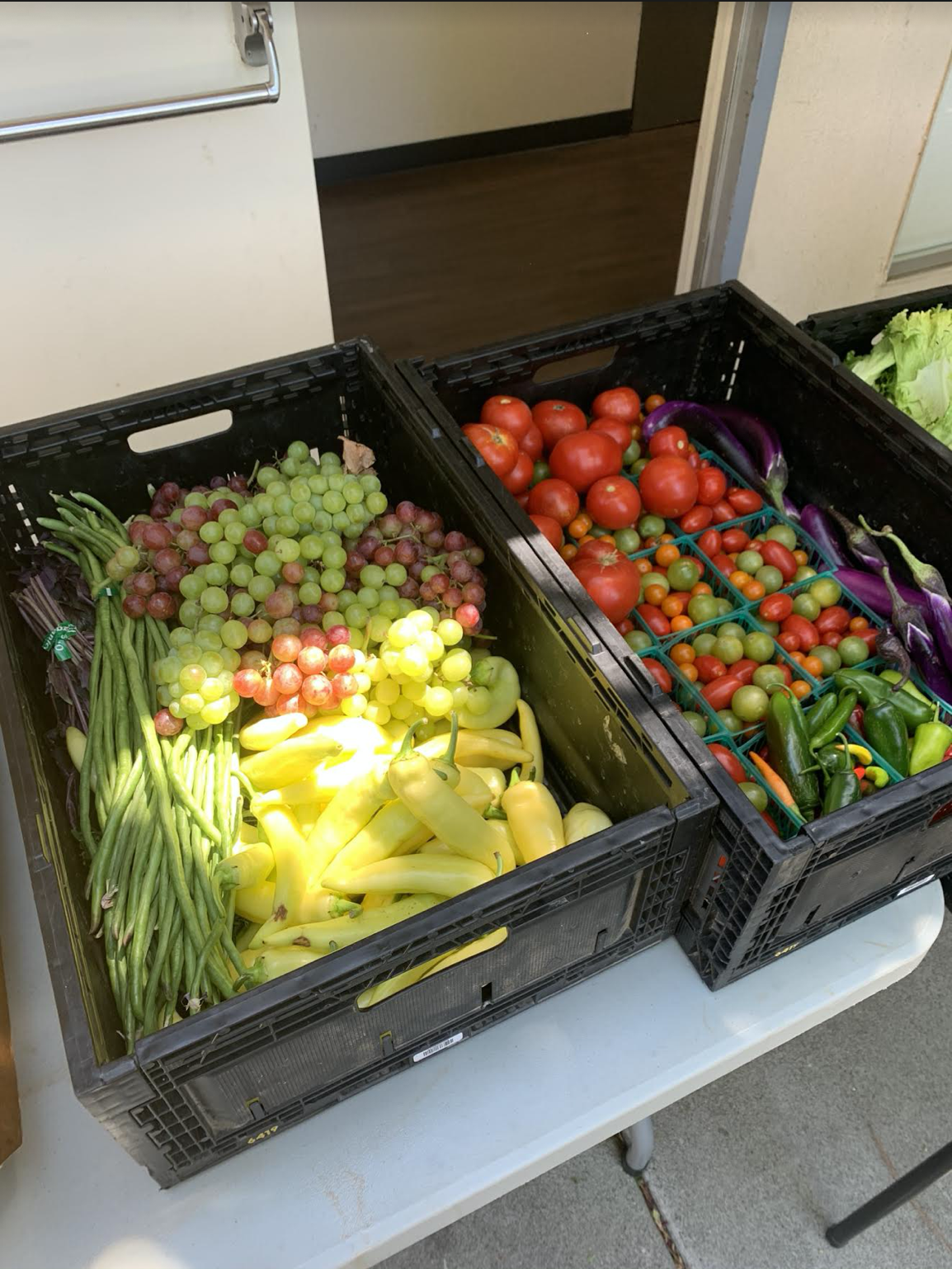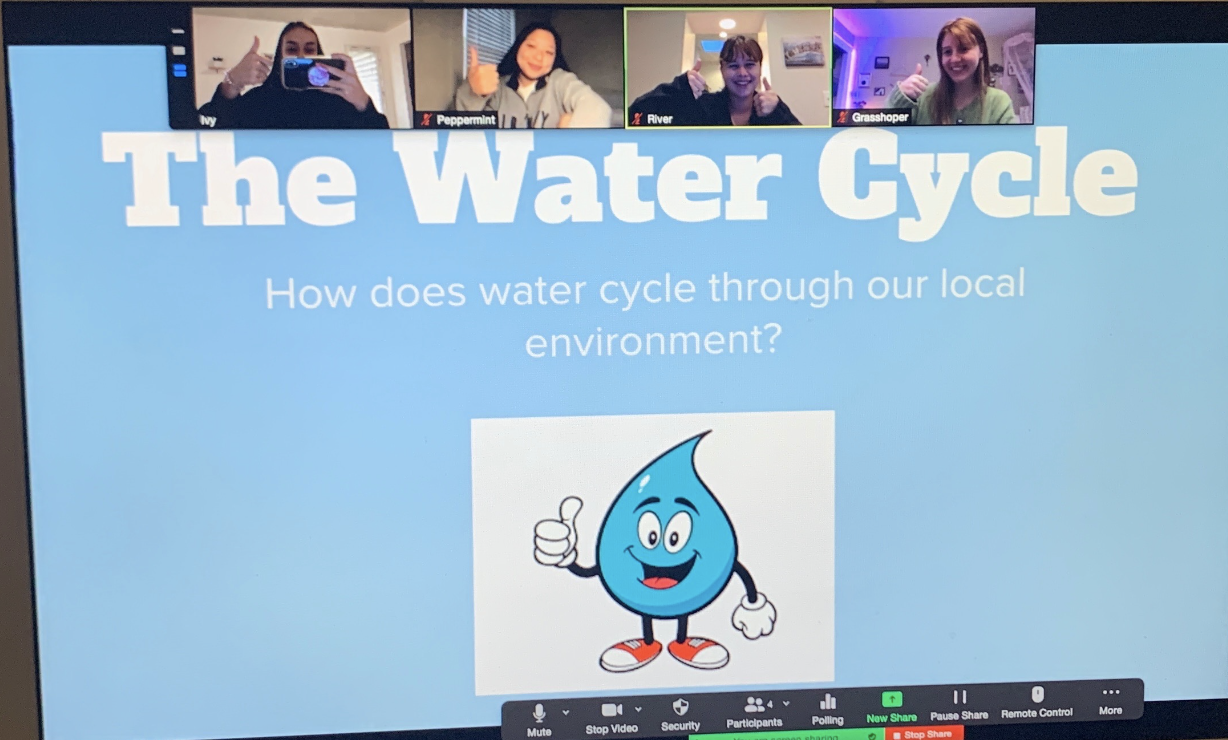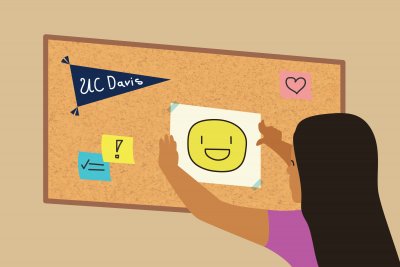Throughout the pandemic, volunteer and service organizations have continued to work to improve the Davis community
With stay-at-home orders and social distancing protocols in place, in-person volunteering activities have been minimal. However, many students and faculty have found ways to safely provide positive impacts on the Davis community. Inspired by actor John Krasinski’s Some Good News, The California Aggie presents a few examples of organizations that have contributed to volunteering and service efforts in the Davis community.

Produce recovered from the Saturday Farmers Market.
UC Davis Food Recovery Network (FRN)
Since 2013, the UC Davis Food Recovery Network (FRN) has worked to reduce food waste while simultaneously feeding the community. The organization has been delivering excess food from vendors to communities in need and spreading awareness of issues regarding hunger and food waste.
“During quarantine, we have been recovering surplus food from Latitude, Segundo and Tercero dining commons as well as the Segundo and Tercero markets once a week,” said Alicia Marzolf, a third-year clinical nutrition major and the president of FRN. “We donate this food to Davis Community Meals. We also recover excess produce from the Davis Farmers Market on Saturdays and then donate this produce to the distribution at Solano Park Apartments.”
Davis Night Market members distribute excess food from Davis restaurants to the community.
Davis Night Market
In spring of 2019, a group of UC Davis graduate students founded the Davis Night Market that aims to combat food insecurity in the Davis community. Valerie Weinborn, one of the co-founders of the Market, noted how the Market has expanded its reach during the stay-at-home order.
“During the pandemic we have continued our food distribution events and we went from twice a week to five times a week (Monday to Friday 9 p.m.),” Weinborn said. “We noticed that when lockdown and shelter-in-place orders started, there [were] more people needing food and also more volunteers, so we decided to expand to five days a week.”
CARE members host Instagram live sessions to discuss the obstacles to a healthy relationship (left).
Graphic designed by CARE members regarding the differences between healthy and unhealthy relationships (right).
UC Davis Center for Advocacy, Resources & Education (CARE)
The UC Davis Center for Advocacy, Resources & Education (CARE), aims to educate and engage students and faculty on issues regarding sexual violence prevention on campus and in the Davis community. Rachel Henry, the education and outreach manager for CARE, stated that the organization has provided resources and online events for students during the pandemic.
“During quarantine we have found that social media, specifically Instagram, has been the most successful way to connect and continue our mission,” Henry said. “[We have] increased our educational posts on Instagram, hosted an IG Live series on relationship values for Domestic Violence Awareness Month back in October and we are currently producing an IG Reels series on safety tips for Stalking Awareness month in January. Our outreach assistant has also initiated innovative projects to support students with wellbeing and self-care.”
Projects include a Self Care Toolkit and a Spotify playlist to help students de-stress.
RIVER members share their exercise essentials via Zoom (left).
RIVER members participate in socially-distanced exercise events outdoors (right).
Recognizing Illness Very Early and Responding Club (RIVER)
TheRecognizing Illness Very Early and Responding Club (RIVER), is a student-run organization that aims to provide preventative care, nutrition and exercise education to underserved communities in Sacramento and Davis. The organization has worked alongside the Yolo County Foodbank, CommuniCare Health Centers and Bret Harte Elementary School to provide access to resources and health and welfare information.
“RIVER is a student-run organization at [UC Davis] that has been working through the pandemic to support our community,” said Kylie Olsen, a fourth-year neurobiology, physiology and behavior major and the co-president of RIVER. “We transformed into a fully online health coach program, working with members of the community to reach their goals. We have interns working on graphics to provide vetted health information as well as interns presenting recipes and workouts for others to learn from. We also support the health of members of our organization by hosting online [or] socially-distanced socials such as workouts and meditations.”

Sprout Up instructors hold sessions on Zoom to teach elementary students about the water cycle.
Elementary students create signs to encourage others to conserve water during Sprout Up meeting (Taken in 2019 pre-COVID-19).
Sprout Up
The UC Davis Sprout Up chapter has worked towards teaching elementary students about environmental science and the importance of being environmentally friendly. The organization has held events to encourage young students to understand the impact they can have on the environment and promote sustainability at a young age.
“Sprout Up at UC Davis is an organization that goes to local elementary schools in the Davis area and teaches first, second and third graders about science and being environmentally conscious,” said Kritika Sharma, a fourth-year biochemistry major and the community manager of Sprout Up. “Our weekly lessons consist of activities about water conservation, different sources of energy and how we can reduce our carbon footprint. Although we are no longer allowed in classrooms, we have been continuing our weekly lessons via Zoom. Our awesome instructors have helped adjust to an engaging virtual platform and help amend our usual lessons […] with activities that kids can do from their own homes.”
Camp Kesem counselors meet via Zoom after Friends and Family Day.
Camp Kesem
Camp Kesem is a nationwide organization in which college students hold an annual summer camp for children who have been impacted by a parent’s cancer. Camp Kesem offers kids a safe and supportive environment while also holding camps packed with fun outdoor activities. Alex Dillabaugh, a fourth-year neurobiology, physiology, and behavior and Spanish double major, is this year’s camp director. Although camp was canceled this past summer, Dillabaugh detailed ways in which the organization has continued to support its campers.
“We have been continuing our efforts despite the pandemic by fundraising throughout the year and even hitting a chapter fundraising record on this fall’s ‘Giving Tuesday,’” Dillabaugh said. “Additionally, we have held a virtual Friends and Family Day, and we will be holding two more throughout the year. During these events we have had various programs for counselors and campers to reconnect.”
Group photo of Clinica Tepati undergraduate members (Taken December 2019, pre-COVID-19).
Clinica Tepati
Clinica Tepati is one of nine student-run clinics in the Sacramento area. The clinic aims to provide accessible healthcare to the underserved Latinx community. UC Davis undergraduate students and medical students work collaboratively to provide basic health care services such as health screenings, health education and primary care to the clinic’s patients. Ananya Narasimhan, a fourth-year genetics and genomics major, is the medical records and technology co-head for Clinica Tepati. Narasimhan commented on the efforts that the clinic has made to continue to provide for patients during the pandemic.
“Here at Clinica Tepati, our undergraduates take a lot of pride in doing whatever we can to better the lives of our patients,” Narrasimhan said. “Although the pandemic has been a huge challenge when it comes to delivering our services to our patients, we are committed to making sure our patients are taken care of. With the pandemic, we were still eager to fundraise for our patients and had even more of a drive considering that the pandemic increased the disparities that our patient population faces.”
Written by: Sneha Ramachandran — features@theaggie.org





